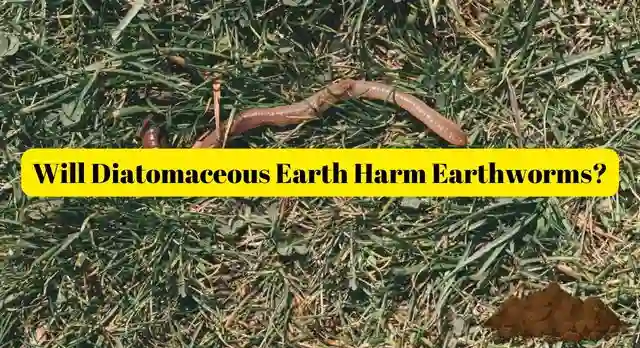Will Diatomaceous Earth Kill Earthworms? The Truth Revealed
No, diatomaceous earth will not kill earthworms when used properly at recommended application rates. Research shows it causes only minor temporary abrasions in earthworms that heal quickly when exposure levels are low. Diatomaceous earth can be used safely for pest control if mixed thoroughly into soil and exposure is minimized.
When it comes to natural pest control solutions, diatomaceous earth (DE) is often recommended as a safe and effective option. However, if you’re an avid gardener or have a passion for soil health, you may wonder whether using diatomaceous earth could harm the beneficial earthworms in your garden.
In this article, we will delve into the topic and answer the burning question: will diatomaceous earth kill earthworms?

What Is Diatomaceous Earth?
Diatomaceous earth consists of fossilized remains of diatoms, tiny aquatic organisms with shells made of silica. The fossilized diatom shells crumble into a fine, chalky powder. Under a microscope, DE resembles bits of broken glass.
These sharp particles can cut and abrade soft-bodied insects like aphids, mites, and slugs. DE is sometimes recommended as an organic pest control powder dusted on plants or blended into soil. However, earthworms also have soft, moist skin that could potentially be damaged by DE.
How Does Diatomaceous Earth Work?
Diatomaceous earth has a unique mode of action when it comes to pest control. It contains microscopic particles with sharp edges that physically damage the exoskeletons of insects, causing them to dehydrate and die. When insects come into contact with diatomaceous earth, it adheres to their bodies and absorbs the waxy layer that helps retain moisture, leading to their demise. The abrasive nature of diatomaceous earth makes it an effective and environmentally friendly option for managing pests in various settings.
Will Diatomaceous Earth Harm Earthworms?
Fortunately, when used correctly, diatomaceous earth poses little to no threat to earthworms. Earthworms have a slimy, protective mucous layer on their skin, which prevents diatomaceous earth from sticking to their bodies. This mucous layer acts as a barrier, keeping earthworms safe from the abrasive effects of DE. Additionally, earthworms primarily reside deep in the soil, whereas diatomaceous earth is typically applied to the surface. This further minimizes the likelihood of earthworms coming into direct contact with DE.
Best Practices for Using Diatomaceous Earth
While diatomaceous earth is generally considered safe for earthworms, it’s important to follow some best practices to ensure their well-being:
Apply DE with care: When using diatomaceous earth in your garden, avoid excessive application. Lightly dust the affected areas, targeting specific pests while minimizing exposure to earthworms.
Avoid excessive moisture: Diatomaceous earth loses its effectiveness when wet, so it’s best to apply it during dry weather conditions. Excessive moisture can reduce its efficacy and make it clump, making it less likely to affect pests while preserving the environment for earthworms.
Focus on problem areas: Instead of applying diatomaceous earth throughout your garden, concentrate on problem areas where pest activity is high. This targeted approach will limit unnecessary exposure for earthworms.
Read More – Does neem oil kill earthworms?
Conclusion
In conclusion, diatomaceous earth is an effective and safe solution for controlling pests in your garden, while also being generally harmless to earthworms. When applied correctly, diatomaceous earth’s abrasive properties mainly impact insects with exoskeletons, while earthworms remain protected due to their slimy mucous layer. By following best practices and using diatomaceous earth in moderation, you can maintain a healthy balance between pest control and the well-being of earthworms, ensuring your garden thrives with both a thriving ecosystem and pest-free plants.
Key Takeaway
- Diatomaceous earth is generally safe for earthworms due to their protective mucous layer and underground habitat.
- The abrasive nature of diatomaceous earth primarily affects insects with exoskeletons.
- Proper application techniques, such as targeted use and avoiding excessive moisture, minimize the potential impact on earthworms.
- Using diatomaceous earth responsibly can effectively control pests while promoting a healthy garden ecosystem.
Related Guide – Do Beneficial Nematodes Kill Earthworms?
What does diatomaceous earth do to earthworms?
Diatomaceous earth (DE) generally does not harm earthworms. Earthworms have a slimy, protective layer on their skin that prevents DE from sticking to them. The abrasive properties of DE mainly affect insects with exoskeletons. Earthworms, being underground and protected by their mucous layer, are not significantly impacted by DE.
Is diatomaceous earth safe for worms?
Yes, diatomaceous earth is considered safe for worms when used correctly. Earthworms are generally unaffected by DE due to their protective mucous layer and underground habitat. It is important to apply DE carefully, targeting pests and avoiding excessive moisture. By following best practices, you can use DE for pest control while ensuring the safety of worms in your garden.
